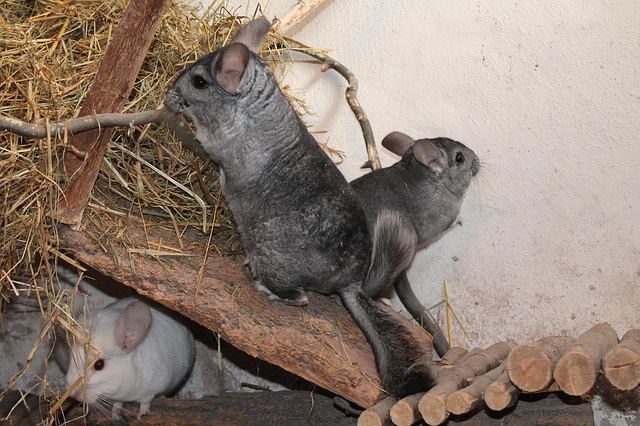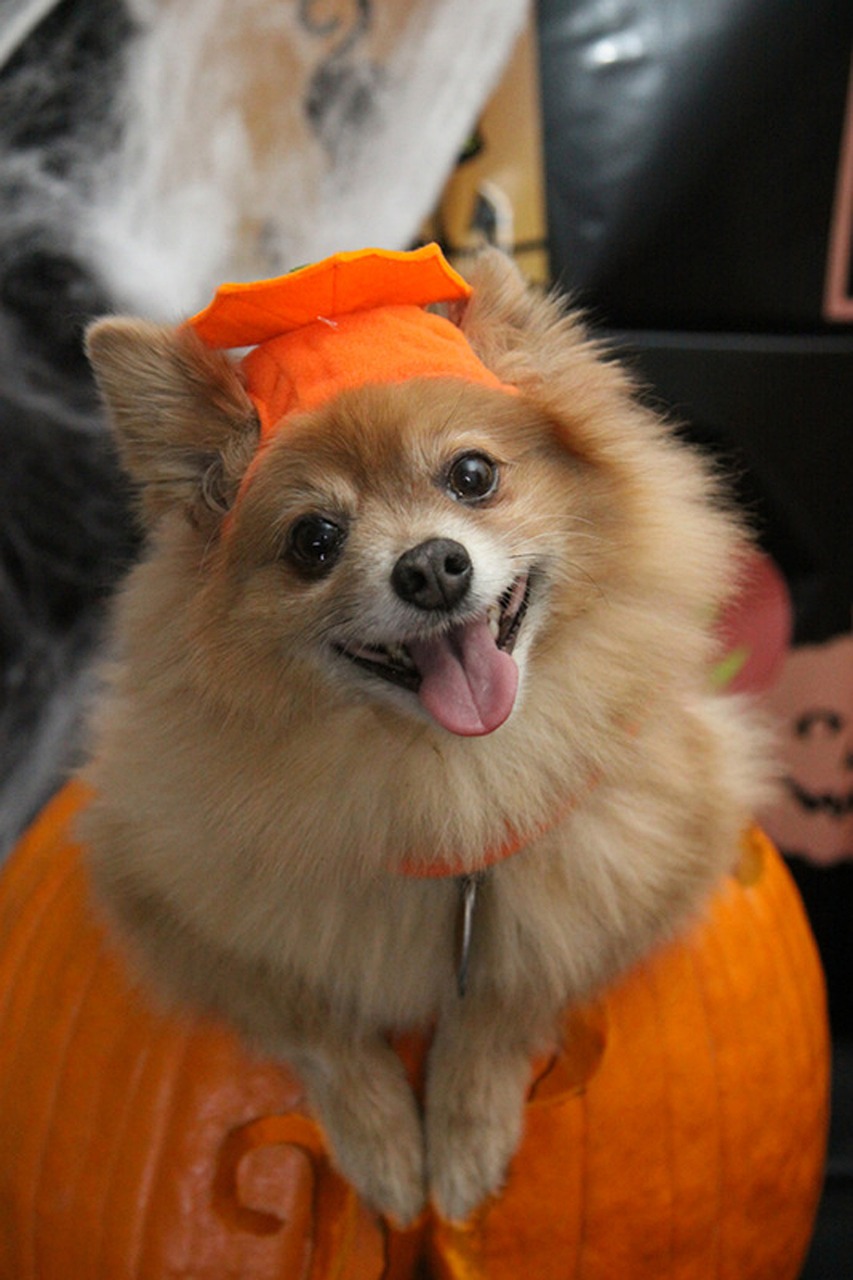Chinchilla Care Guide:
From Oxbow Pet Products
Oxbow offers this basic care guide to help you keep your pet chinchilla healthy and happy. Read below to learn what to feed your chinchilla, as well as other important facts that will make you a confident pet owner.
Feeding Your Chinchilla
Your chinchilla is a herbivore, which means he eats only plant material. Herbivores need to have food moving
constantly through their digestive systems to avoid health problems. A diet of mostly grass hay provides the fiber
necessary to accomplish this. Add fortified pellets daily to round out your chinchilla’s healthy diet. Your chinchilla
must have the right mix of hay, pellets, and treats to avoid health problems.

Hay
Grass hay is absolutely vital to the digestive health of your chinchilla. It helps prevent obesity, dental disease, diarrhea and boredom. Your chinchilla should have unlimited access to quality grass hay and should consume an amount equal to twice his body size every day. Unless the hay in your pet’s habitat is soiled, do not replace it. Replacing it could encourage picky eating! You can also offer small amounts of alfalfa hay to chinchillas with higher nutritional requirements, including animals less than a year old, geriatric, pregnant or nursing animals, or chinchillas recovering from an illness. In a healthy adult chinchilla’s diet, use alfalfa only as a treat.
Hay Selection
- Grass hay should make up the majority of your pet’s daily diet.
- Resist offering the same type of hay. Offer a variety of hay for optimum health.
- Hay is a product of nature, so it’s normal for each bag to look and feel different.
We recommend stocking at least two of these Oxbow varieties of all-natural farm-fresh grass hay: Orchard Grass, Western Timothy, Oat Hay, Botanical Hay and Organic Meadow Hay.
Pellets
A complete fortified pellet helps you make sure your pet is getting all the vitamins and minerals required for a healthy diet. A high-fiber pellet made from hay is best for your chinchilla.
Pellet Selection
- Choose a pellet designed especially for chinchillas, such as Oxbow’s Chinchilla Deluxe™.
- Avoid mixes with nuts, corn, seeds and fruit. Chinchillas have a habit of selecting these tempting morsels and leaving the healthy pellets.
- Always transition your pet gradually from one food to another.
Treats and Veggies
 Treats are a great way to bond with your
chinchilla. You love giving treats and he loves
eating them! However, the main purpose
of a treat should be to encourage interaction
between you and your chinchilla. Offering too
many treats can encourage your pet to refuse
basic foods and rob him of nutrition. Contrary
to popular belief, chinchillas don’t need a steady
supply of carrots and other sweet treats such as
yogurt drops and seed sticks. Offer all-natural
treats only after your pet eats a healthy meal.
Leafy greens are healthy and natural food
choices for your chinchilla. They are also a
good source of water and offer a variety of
textures. However, leafy greens should be given
in moderation - no more than the size of your
pet’s head every day. Greens such as romaine,
bib and red leaf lettuces are good choices for
your chinchilla. Avoid iceberg lettuce, as it
might cause digestive upset. As with any new
food, be sure to introduce new greens and
vegetables slowly to avoid upsetting your pet’s
stomach and causing diarrhea.
Treats are a great way to bond with your
chinchilla. You love giving treats and he loves
eating them! However, the main purpose
of a treat should be to encourage interaction
between you and your chinchilla. Offering too
many treats can encourage your pet to refuse
basic foods and rob him of nutrition. Contrary
to popular belief, chinchillas don’t need a steady
supply of carrots and other sweet treats such as
yogurt drops and seed sticks. Offer all-natural
treats only after your pet eats a healthy meal.
Leafy greens are healthy and natural food
choices for your chinchilla. They are also a
good source of water and offer a variety of
textures. However, leafy greens should be given
in moderation - no more than the size of your
pet’s head every day. Greens such as romaine,
bib and red leaf lettuces are good choices for
your chinchilla. Avoid iceberg lettuce, as it
might cause digestive upset. As with any new
food, be sure to introduce new greens and
vegetables slowly to avoid upsetting your pet’s
stomach and causing diarrhea.
Chinchilla Behaviors
Chinchillas are affectionate, intelligent, playful animals that bond quickly with their owners. They are very active and love to play. Chinchillas also need to take dust baths which are necessary to counterbalance naturally oily skin and maintain beautiful soft fur. Make sure to use lava dust specifically made for chinchillas. Some of your pet’s behaviors can seem strange. You might notice your chinchilla eating his own poop, for example. This is a natural behavior essential to his diet, because it provides extra vitamins and nutrients.
Housing Your
Chinchilla
Choose a cage large enough to allow your chinchilla to climb, jump, play and explore, with enough space for a dust box and fun items such as Timothy Club™ Tunnel or Lounger. Your chinchilla also needs litter material or bedding in his cage, such as Oxbow’s natural Eco-StrawTM. Avoid aromatic cedar and pine shavings with resins that could irritate your chinchilla’s skin and lungs. Hay should always be available to eat, as well as clean water to drink, preferably in a sipper bottle. Place your chinchilla’s home near household activities, but away from direct sunlight and drafts. Chinchillas look forward to playtime with you. Before letting your pet out of his cage, make sure the environment is right for fun. Check cords and outlet covers. Place houseplants out of reach, because some can be poisonous. Be prepared for your pet to chew on just about anything, including curtains, carpets
Your Chinchilla’s Health
Many chinchilla health problems are a result of poor nutrition, digestive or dental problems or obesity. Contact your veterinarian if you notice the following symptoms:
- Loose or soft stools
- Blood in the urine
- Wet fur under chin
- Sneezing or trouble breathing
- Hunched in corner
- Overgrown front teeth
- Bald patches in the fur
- Sores on the feet
- Abnormal eating or drinking
Regular veterinarian visits are a crucial part of keeping your pet healthy and happy. At each visit, your pet will be weighed and examined. Be prepared to answer basic questions about the animal’s diet, behavior and health. If you have questions or concerns, make a list ahead of time so you’ll remember what to ask. Your veterinarian might recommend that you have your chinchilla spayed or neutered at a certain age. Spaying or neutering may help your pet live a longer, healthier life.
- Oxbow’s Chinchilla Deluxe™
- At least two varieties of Oxbow’s farm-fresh hay
- Oxbow treats for healthy bonding and enrichment
- Water bottle
- Heavy food bowl
- Large cage with solid flooring
- Hay habitat such as Oxbow’s Timothy Club™ Bungalow or Tunnel
- Litter box
- Oxbow’s Eco-StrawTM litter
- Lava Dust and Dust bathhouse

